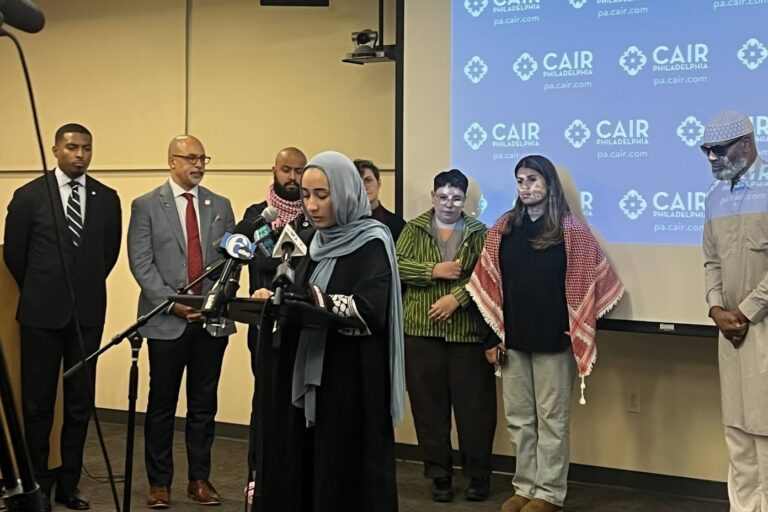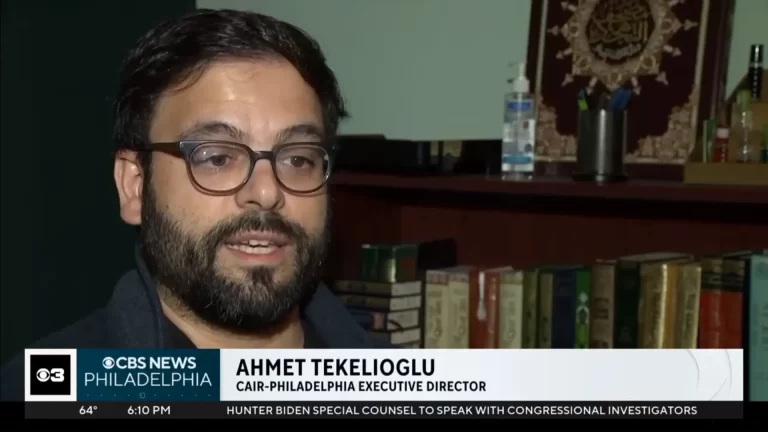![]()
by Elizabeth Wellington
Fashion Columnist, Philadelphia Inquirer
The French ban on the Muslim niqab, in the spirit of “liberation,” violates a human right.
When I think of France, I think of exquisite cuisine, impressionism, and of course, high fashion. How could I not? The country is the birthplace of haute couture and home to fashion houses Coco Chanel, Jean Paul Gaultier, and Hermes.
It’s also the French appreciation for artistic freedom and beauty that prompted organizers of the Philadelphia International Flower Show and this month’s Philadelphia International Festival of the Arts to salute the country.
But free-spirited France is being rather draconian when it comes to Muslim women’s attire. Last week, the country formally banned the wearing of face veils, or niqabs, in public, authorizing a fine of 150 euros, about $215, and possible arrest if a woman had her nose and mouth covered.
Do you think French President Nicolas Sarkozy tells his wife, Carla Bruni, often referred to as one of the best-dressed women in the world, what to wear?
Nonetheless, caving to pressures from conservatives, the French government argued that the niqab hinders a very important part of French culture: Passersby should be able to make eye contact – before they snub you, of course.
Considering the niqab doesn’t actually cover one’s eyes, French leaders were sure to add that they were interested in liberating Islamic women from ancient, patriarchal rules of subservience in a country where Islam, after Catholicism, is the second most popular religion. After all, they point out, the Quran does not require women to specifically cover their faces in public – only that they cover their heads and dress modestly.
(This is not the first time French leaders have targeted Muslim attire. In 2003, headscarves were outlawed in public school, and it’s against the law for Muslims to take their ID pictures while wearing their burkas.)
The law “stems from a French antipathy or hostility to extreme visible difference in public life,” explained John Bowen, a professor of sociocultural anthropology at Washington University in St. Louis, who wrote Why the French Don’t Like Headscarves: Islam, the State, and Public Space (Princeton University Press, 2006)
“France is based around the fiction that everyone is basically the same: speaking the same language, having the same instincts. It’s very different from our American notion of how we live together.” He pointed out that these kinds of laws often are an excuse to rid society of the Muslim garb that many associate with violence.
But Muslim women, both those who completely cover up and those who don’t, say they don’t need, or want, France to liberate them. Wearing a niqab, which many claim is the ultimate form of following the tenets of their religion through attire, is their choice.
“I’m really glad to be an American,” said Margari Hill, a practicing Muslim and teacher at Al-Aqsa Islamic Academy in Germantown, who does not wear a niqab. “I’m concerned for Muslims in France. This is about human rights.”
And she’s right. It amazes me how often fashion choices reflect bigger issues.
As to apparel choices, I’m as liberal as they come. Take panty hose: I’m not a fan, especially in summer. I don’t think there is an age limit on great-fitting jeans. And who says women have to wear skirts to be professional? My mantra: Make a choice, wear it with pride, and feel free to change your mind tomorrow.
Yet I’ve also been known to cringe at women who wear ill-fitting, tight, strapless red dresses at, say, the shopping mall. But I don’t automatically assume she’s offering up her services. (Although she may be fashion-challenged.)
In that same vein, I often think it’s unfair for Muslim women to have to cover up in the presence of men. Every time I’m on Kelly Drive and I see a Muslim walking a portion of the loop covered from head to toe, including a niqab, in 80-plus-degree weather, the feminist side of me starts to quake.
But it’s quaking now too because France, where only about 2,000 of the at least 5 million to 6 million Muslims who live there actually wear niqabs, is taking away a woman’s right to choose what she’s comfortable wearing.
So far more than 60 people have been arrested in protests, 19 of them Muslims wearing the niqab.
In the Philadelphia area, there are about 250,000 Muslims, according to Moein Khawaja, executive director of the Philadelphia’s Council on American Islamic Relations. Roughly half were born overseas in places like Pakistan, Turkey, or West African countries. The rest are mainly African Americans whose families converted during the Black Power movement of the 1950s, ’60s and ’70s or are recent converts themselves.
Again, only a small minority, less than 5 percent, wear niqabs, Khawaja said. But they do it of their own accord.
“The truth is that every single woman I know that covers up does it on her own,” said Khawaja, who is married. His wife dresses modestly and covers her head, but she doesn’t wear a niqab.
“It’s their way of saying, ‘Forget what everyone wants me to do.’ It’s empowering for them to have control over their own style of dress.”
Afeni Stones of East Falls is one such woman. Stones, 38, converted to Islam when she was in her early 20s, and is a mother of four, including a 14-year-old daughter.
Initially Stones wore a niqab in public, but she stopped when she took a job as an administrative assistant at a downtown firm – she was concerned the veil would make her appear “unapproachable.” Three years ago, she decided to go back to wearing the niqab as a way of expressing her complete dedication to Islam.
At no point, Stones said, did her husband ask her to wear the niqab.
Stone and her husband require their daughter to cover her head when she leaves the house, but the family has decided that she does not have to wear the face veil when attending school and hanging out with her friends.
“For me, it’s been a journey,” said Stones, who now works as an administrative assistant at a local university. “I’m just at a place in my life where I’m very confident in outwardly expressing my religious identity, and I don’t get hung up on the looks and the comments.”
And isn’t that the whole point of liberation?





